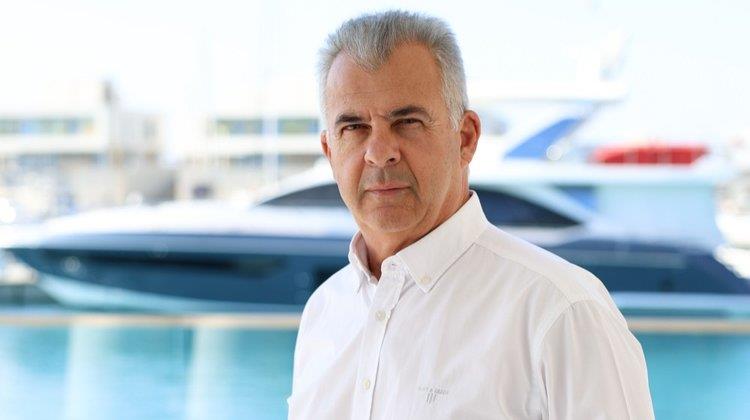Costas Fitiris, Chief Marina Officer of Ayia Napa Marina, has highlighted the shortcomings of the recently passed legislative framework governing marinas, arguing that without incentives, there will be no growth or increase in yacht numbers in Cyprus.
In an interview with InBusinessNews, Fitiris noted: “Instead of the new law offering incentives and creating favourable conditions to attract large leisure yachts for berthing, repair, and refuelling, all of that was omitted following negative recommendations by government services.”
He further stressed: “The law now exclusively includes the obligations of marinas and the methods of governmental oversight, failing to meet its main objective: attracting investment and superyachts.”
Fitiris said the state must recognise the significance of projects like the Ayia Napa Marina and develop a flexible, investment-friendly environment.
He also touches on the local government reform, suggesting that if it had been implemented using the criteria defined in feasibility studies, it would have benefited both society and businesses.
Ayia Napa Marina: A hub of continuous growth and development
Reflecting on Ayia Napa Marina’s four years of operation, despite global challenges such as COVID-19, the Russia-Ukraine war, and conflicts in Lebanon, Fitiris stated: “Ayia Napa Marina is an iconic project—not just for the Famagusta district but for all of Cyprus. With hundreds of millions in investments from major shareholder Naguib Sawiris and the Caramondani Bros Group, it has become a luxury destination that combines yachting with premium hospitality, offering both permanent and short-term high-end stays.
“This is not just a marina—it is a development hub that boosts the economy, creates jobs, and draws international investment, particularly to the Free Famagusta Area,” he pointed out.
As Fitiris said, despite external shocks, Cyprus remains a stable pillar of development and investment in the Eastern Mediterranean, with steady growth and ongoing foreign trust.
However, he warns that much better prospects would be possible—both for large-scale developments like the marina and in other sectors—if public services and the private sector cooperated more closely. Bureaucracy must evolve to meet modern business and societal demands.
Impact of local government reform on Marina and nautical tourism
Fitiris acknowledges that the local government reform, launched in Ayia Napa on 1 July, was a precondition for unlocking EU funding. However, he believes the reform failed to live up to its potential because political interests outweighed the public good, undermining resource savings, operational efficiency, and license processing for major projects.
He calls for flexible and creative solutions, stressing that the new regional plan for Famagusta must be revised, especially in relation to building coefficients and height restrictions. Development must also consider environmental protection—but reasonably, as in other districts.
“Without such changes, the outlook for Free Famagusta’s growth is bleak.”
He criticises the overburdened public service and restrictive laws that hinder growth, particularly in Famagusta, a region long plagued by seasonality. Harsh, irrational regulations are unfair, especially when other districts benefited from more lenient policies, he said
It is also unacceptable, he said, for politicians to claim that past mistakes in other districts must be prevented in Famagusta, especially when those “mistakes” led to prosperity elsewhere.
“Even mistakes and injustices must be fairly distributed,” he said, quoting Aristotle.
But for Fitiris, the most damaging result is the outflow of young people from the district, leading to a winter standstill that negatively affects the marina and broader local economy.
Legislation on marinas: Incomplete and inadequate
On the recently passed marina legislation, Fitiris expressed his strong opposition to its final form.
Since 2022, both Ayia Napa Marina and the Cyprus Marinas Association have worked to update the outdated 1977 law, which only applied to Larnaca Marina, he explained, adding that there was a clear need to institutionalise modern marina operations, especially given that Cyprus' marina infrastructure is worth over €1 billion.
“In the face of intense regional competition and global economic uncertainty, Cyprus must act to secure its position in maritime tourism,” he warned.
What’s needed to attract superyachts to Cyprus
To attract leisure boats—especially superyachts—Cyprus must be competitive, said Fitiris.
“In nearby destinations, when superyachts dock temporarily for refuelling or repairs, they benefit from reduced taxes and VAT exemptions. Bureaucratic processes are streamlined under special regimes,” he said. Instead, he mused, Cyprus’ new law lacks any such incentives, containing only marina obligations and oversight mechanisms, ignoring the main goal of attracting foreign investment and large vessels.
And so, he said, “Without incentives, there will be no growth or increase in incoming vessels. Consequently, state revenues will also decline”.
In a well-organised state, he says, such policies would be proactively designed by the government, taking into account market demands and private sector input.
Challenges from illegal marinas in occupied territories
Fitiris also raised concerns about the illegal marinas built in the occupied areas, which he said create unfair competition, especially for Ayia Napa and Paralimni marinas.
Hence, he urged the government to immediately enforce the "Closed Ports Law" – a law restricting vessel access to the ports in occupied Famagusta, Karavostasi, and Kyrenia – against these marinas, even if they are only used for recreational—not commercial—purposes.
A call to action
Fitiris concluded with a call to all involved: “Let’s collaborate in unity and with new ideas to ensure growth and prosperity. Cyprus has the potential to lead in nautical tourism. All it takes is bold, collective, and well-planned action.”









